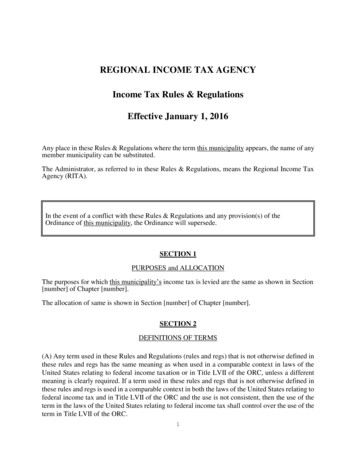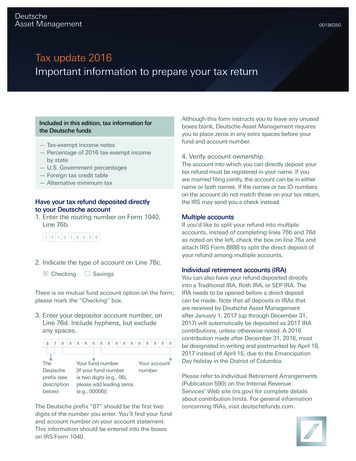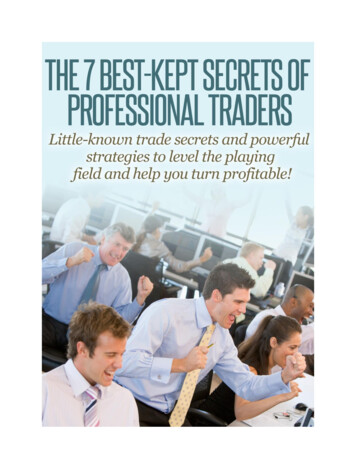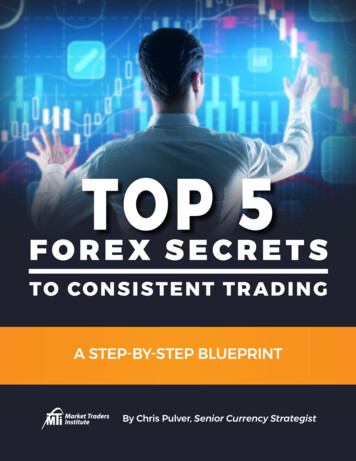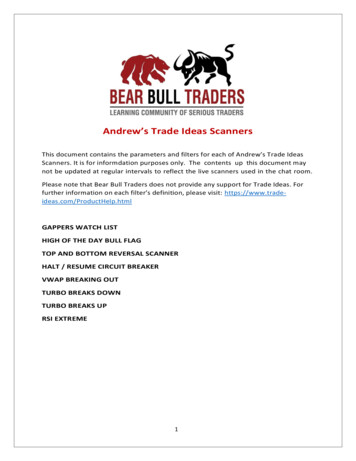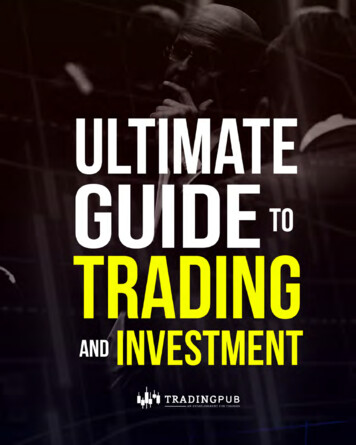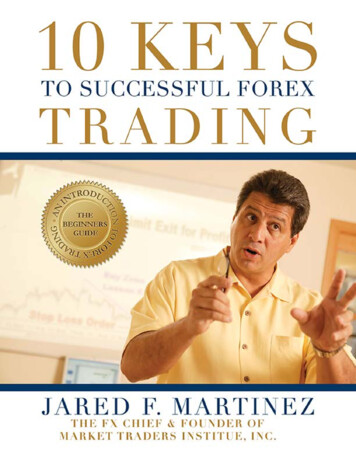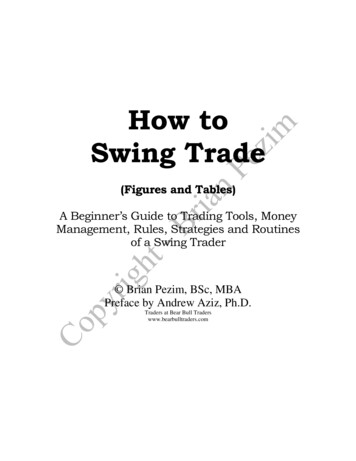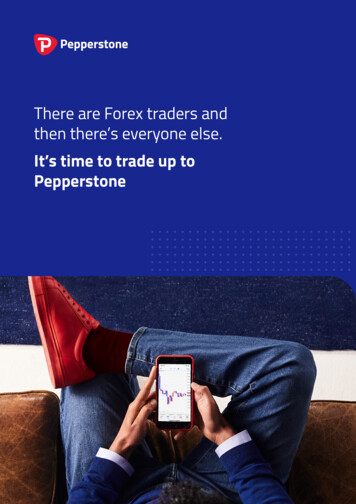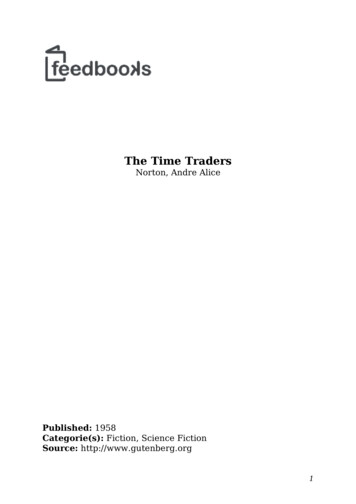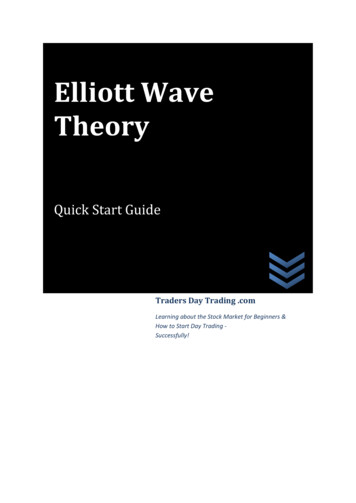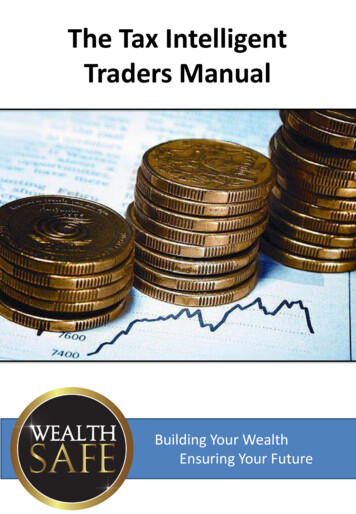
Transcription
The Tax IntelligentTraders ManualBuilding Your WealthEnsuring Your Future
THE TAX INTELLIGENT TRADER(5th Edition 2012)By Warren BlackIntroductionBy now you have started your exciting journey to being a successful trader! Or I hope so . (Or even betterstill, I hope you are already a successful trader making squillions of dollars!)As an accountant and lawyer, I love seeing my trading clients become financially independent and living thelife of their dreams through trading the world markets in the comfort of their own home.What a wonderful way to make money! It is hard to imagine a business with lower staff and overheads, nooffice premises, virtually fixed costs, regardless of how much money you make, you name it.But whether it is options, Forex, CFDs, futures, Eminis, shares, writing covered calls, warrants, or anyother form of trading or instrument strategy, we all must face the taxman. Everyone has to pay tax, andunfortunately, in Australia, at high rates. And even worse, after you have made your trading profits, andpaid your tax, someone (like a creditor, or lawsuit-hungry predator, or nasty ex spouse) turns up knockingat your door wanting their slice of the pie.We live in a culture where greedy golddiggers are always seeking a slice of your hard earned wealth. “Toreap where they have not sown ”And most people aren’t prepared for when this happens and end up with a rude shock when it does.THE TAX INTELLIGENTHere’s some shocking statistics: 69% is the average tax paid by Australians 48% of businesses go bankrupt indirectly because of government action, and the taxman is a majorTRADERS MANUAL!factor (ie. unpaid group tax, PAYG, GST, etc.) The average east coast Australian is sued THREE times in their lifetime, and New South Wales andQueensland, for example, are in the top 5 places in the world for lawsuits per head! 80% of small business fail in the first 5 years, a further 80% fail in the next 5 years 95% of people lose money in trading the markets. So the statistics aren’t in your favour.As a lawyer and accountant, I am always asked by my trading clients how to slash their tax, and how theycan stop greedy golddiggers from getting to their assets.1
Not only that but most traders get a rude shock if the ATO decides to audit them (and believe me, theyoften do). If the trader doesn’t meet very strict criteria, the ATO can, and often do, say that you are notcarrying on a legitimate business, and therefore, you can’t claim all your expenses.I decided to write this book to ensure this doesn’t happen to you!Intelligent tax planning is one of the best kept secrets of the rich. The rich know the importance of a goodtax accountant or lawyer to keep their tax down to the bare minimum. The rich know that as their wealthgrows, the golddiggers rub their hands with glee, seeing them as having “deep pockets” and an easy targetfor quick cash. They also know the ATO wants to maximise their slice of the pie.So the rich know the importance of a tax and asset protection guru to not only slash their tax to the bareminimum 100% legally, but also, to secure their assets from greedy golddiggers.As a trader, you will have many questions, such as: What is the best structure to trade in? Should I use a company? A trust? Why can’t I just trade in myown name? Can I use my self managed superannuation fund to trade? How do I work out my tax as a trader? Can I claim the cost of my courses in learning how to trade? What about my software and all my subscriptions? What other expenses can I claim as a trader? What happens if I make losses in my trading? Can I offset them against my day job income? Can Ioffset them against future profits?The good news is, the answers are all contained in this Manual.Welcome to The Tax Intelligent Traders Manual; a ground breaking book that transforms you from a taxdummy into a tax intelligent trader, ensuring you keep the wealth that you make!In this book, we look at a number of things. We introduce you to the different structures you can use totrade options or shares. We introduce you to the best way to work out your tax. We look at the expensesyou can claim as tax deductions. We look at whether you can claim your losses as a trader. And we look at awhole number of other questions that you would never even have thought of.2
Anything that my clients have ever asked me, I have covered in this book. If there is anything that youwant to know that is not covered in this book, please email me at help@wealthsafe.com.au and me or oneof my staff will gladly assist you.This book is the only one of its kind in Australia at present. Nobody else has written a quality book onoptions (or any other) trading, and the tax and structuring impact of it.This book is written in a Frequently Answered Question and Answer format. It is not intended to be anexhaustive guide to replace professional advice, however, so keep that in mind.Finally, this book is only introductory. If you want a more in depth treatment of the subject matter, pleasecontact us at Wealth Safe on the contact numbers at the end of this e-book or at the websitewww.wealthsafe.com.au (and sign up for your free book on the Tax Secrets of the Rich), and obtain yourfree 30 minute consultation with one of our staff.Or alternatively, attend one of the author’s specialist seminars by contacting us on 1300 669 336.3
DisclaimerBefore you start, please read the following disclaimer.This book is only intended to be an educational guide. It is designed to educate you and bring awareness ofthe tax issues that you face as an trader. That is all it is meant to do. It is not meant to give specific advice.Every case is different. If you are serious about trading, go and get professional advice from your taxspecialist as to the best way to structure, and whether you can claim your expenses as a tax deduction inyour specific circumstances. (You can contact us and arrange a specific consultation to go through your taxaffairs; we are specialists and we understand the ins and outs of trading having done it ourselves!)Bearing the above in mind, we trust you will find this guide sensational to help you move forward andbecome a tax intelligent trader!About the AuthorWarren Black, B Com, LLB (1st Class Hons), Dip Fin Pl is a qualifiedlawyer (with First Class Honours) and accountant and financial plannerwith nearly 20 years experience in taxation, asset protection and businesslaw.Warren is an experienced professional presenter who has presented acrossAustralia and internationally at many seminars on tax and asset protection,including Money Masters, 21st Century Academy, Mal Emery Platinum,Universal Events, and many other events from time to time.Warren worked for 10 years at the Australian Taxation Office (ATO). Since leaving the ATO, Warren hasworked over 10 years in law and accounting. Warren has exceptional skill in tax planning, asset protection,commercial law, international tax and estate planning, among other things.Warren Black also won the Mallesons Stephen Jacques prize for his Honours thesis on Income Tax andCapital Gains Tax.4
1. How do you tax the profits and losses of Traders?In working out the tax on your profits or losses as a trader, and what expenses you can claim as taxdeductions, your first question is whether you are a trader or speculator. The ATO is very strict on thisissue, and has guidelines as to what they accept and don’t accept.A trader is someone who trades options, shares, forex, CFDs or futures for a living. They treat it as aproper business and not as a hobby.A speculator by contrast treats their trading as a hobby. They trade the markets for speculative purposes,ie. sporadically, or occasionally, with no real system.Traders are treated differently for tax purposes from speculators. It is far better for tax purposes to beclassified as a trader than a speculator.The ATO rewards you if take your business seriously. Let’s take a simple example.ExampleJohn lives in Bondi in Sydney. John has 5 chooks in his backyard. He and his family live off the eggs and hesells a few eggs next door to his neighbour Mary. He keeps no records.In no way is John carrying on a business. It is only a hobby. The money Mary gives him would not betaxable. But nor would the expenses that John pays on the maintenance or purchase of his chooks be taxdeductible. There is no sense of commerciality or business-like system in what John is doing.By contrast, let’s take Farmer Joe who lives in Halls Creek. Farmer Joe has 2,000 chickens, a specialincubator, special equipment and feedstuffs, top quality, business software systems to manage his chickens,you name it. He sells the eggs to supermarkets, wholesalers, etc. He keeps detailed records, uses MYOB,and has an accountant, and runs his farm through a unit trust structure.Clearly Farmer Joe is carrying on a business. He would be taxed on his receipts. But he could also claim allhis associated expenses with his chickens as a tax deduction.Now that we have discussed, this, let’s look at some general principles for traders. These principles are onlygeneral but will give you some excellent guidance.5
A.SPECULATORIf you trade as a hobby and do not carry on business as a trader (ie. you do it now and again with noregularity, no system and in an un-business-like manner), the capital gains tax (CGT) regime applies.This is not the result you want.Let me tell you what happens if you’re a speculator.1.Trading profits. Your trading profits will be taxed as capital gains at your FULL marginal tax rate, notas ordinary income. This is critical in what expenses you can claim as tax deductions (discussedbelow). The only way to avoid this result is if you can show that you have entered into a commercialtransaction of a revenue nature, which you won’t always be able to do. Note this can occasionally beof benefit as you can claim a 50% discount against your capital gains if you hold the asset (eg. share)more than 12 months, but traders do not hold shares for more than 12 months, and certainly notwith options. This is for investors.2.Tax deductions. Here’s the critical issue. If you are treated as a speculator, you will have difficulties inclaiming tax deductions for your trading expenses (such as attending seminars, educational courses,computer software, manuals, books, trading data, etc.). You will only be able to offset these costsagainst your capital gains. The problem with this is many of your costs cannot be offset against yourcapital gains, eg. seminar costs, software or subscription costs, computer costs, etc.3.Trading losses. If you make losses from your trading, there are limits in claiming your trading lossesagainst your other income (such as your day job income from your job as a manager at Coles, forexample) as you pay CGT on your trading profits. In practical terms, this means if you make a netloss on your trading at the end of the year, you can only deduct your losses against capital gains fromother activities (eg. buying and selling property, shares, etc.). If you do not have any other capitalgains, you cannot deduct your losses against your other income, eg. such as salary and wages fromyour day job, or other business income. Yet if you make profits, you are fully taxable on them withonly some reductions. Not very fair is it?! But that’s tax in Australia for you!But if you are a trader, life is much better, as you will see below. The key is to be classified as a trader bythe ATO as the tax benefits are a lot better.Let’s look at the benefits of being a trader.6
B. TRADERIf you are considered to be a trader by the ATO, the position is more favourable:1.Trading profits. Profits are taxed as income (not capital gains). The practical effect is not greatlydifferent from being taxed as a capital gain as a speculator (except in certain instances, such asoptions traders who buy long term options, or share traders who buy shares for buy and holdpurposes, that is, for long term capital growth) but there is a great difference in relation to the taxdeductions you can claim.2.Tax deductions. Here’s where the real differences arise. If you incur costs in becoming a trader, such aseducational costs, subscriptions costs, computer software costs, data subscription costs, subject toanother issue that I will discuss shortly, you can claim these costs as tax deductions against yourtrading profits. Even if you are not a trader (ie. your costs are learning to trade), you usually canclaim a deduction for your costs over 5 years. Again this is explained below.3.Trading Losses. Unlike speculators, if you make losses from trading, in some cases, you can deductyour losses against your other income (like your day job salary and wages or your business income),subject to the non-commercial loss rules, which are discussed later on.Clearly you want to be classified as a trader. Not as a speculator.2. How do I tax my trading profits as a Trader?As a TRADER, your profits and losses are taxed under the income regime.However an issue arises as to the TIMING of taxing your profits and losses.That is, when do you claim your expenses and declare your income from specific transactions? Eachtransaction has a buying and selling point; do you look at net profits? Or do you examine individualtransactions in isolation?To explain further, let’s take an example using options trading. Similar principles, however, can apply tofutures trading, or other forms of trading.ExampleAssume that you buy a BHP CALL contract for 0.50, an outlay of 500, on 1 Feb, with the optionexpiring on 26 Feb. You also write an ANZ PUT for 0.60 on 1 Feb and receive 600. You sell the BHPCALL on 4 Feb for 0.80, receiving 800. You leave the ANZ PUT until expiry and keep your 600.7
There are 2 methods for taxing this transaction:1. Individual transaction method. You look at each transaction individually. In your tax records, youdeduct 500 on 1 Feb, you include 600 as income on 1 Feb and you include
Trading losses. If you make losses from your trading, there are limits in claiming your trading losses against your other income (such as your day job income from your job as a manager at Coles, for example) as you pay CGT on your trading profits. In practical terms, this means if you make a net
